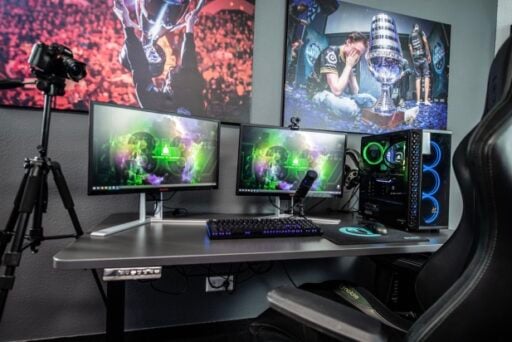Gaming often gets bad press due to its correlation to addiction, violence, and cyberbullying.
In recent years, the gaming world is witnessing exponential growth. With gaming becoming increasingly immersive, concerns regarding its potential impact on students’ academic performance exist.
This essay explores the intricate relationship between studying and gaming. We take a deep dive into the positive and negative impacts of gaming on academic performance.
Negative Impacts of Gaming on Academic Performance
There is an ongoing debate on the impact of gaming on the academic pursuits of students. Students can easily access different video games. Recent studies show that gaming addiction starts at the age of six.
Video gaming addiction is highly correlated to contributing to social anxiety and mental health. There is a link between depression and self-esteem with hours spent by students playing video games.
In addition, most critics argue that gaming is a major distraction that diverts students’ attention from academic pursuits. One alternative for students to make up for the lost time is turning to do my essay cheap services.
Excessive gaming is known to eat into study time, poor time management skills, and procrastination.
Also, the nature of video games can bear a significant impact on the holistic development of students. For example, excess exposure to violent video games promotes aggression while impeding cognitive development.
How Gaming Addiction Starts

A sad reality about gaming addiction is that many students have tried to quit the habit. Unfortunately, these video games act as a getaway from the harsh realities of life while exploring virtual reality.
The first path toward gaming addiction is through escapism and emotional regulation. These video games offer an avenue to alleviate freedom, boredom, stress, and negative emotions by enrolling in the virtual worlds.
These students often view video games as a coping mechanism that offers some reprieve from academic pressure, societal expectations, and personal issues.
In addition, video games act as means of interaction and peer influence. Online multiplayer games offer students a platform to engage and interact with other peers. Thus, it creates a feeling of belonging.
The ease of access to internet services also contributes to high cases of gaming addiction. The convenience to access different technologies such as:
- Smartphones
- Tablets
- PC
- Laptops
This ensures constant use and uninterrupted access. In the end, it blurs the line between fun and study time.
Benefits of Gaming to Students
Despite the negative connotation of gaming toward academic performance, there are inherent benefits gamers gain. Some of these benefits include:
1. Experiential Learning
Recent research shows that gaming offers experiential learning tools because it enhances retention and memorization.
Moreover, it gives students a wide chance of areas to explore and continue the learning process.
2. Development of Cognitive Abilities
Cognitive abilities such as problem-solving, analytical thinking, and critical thinking are essential for a student’s holistic development. These skills are readily available when gaming. Gamers utilize these skills in solving puzzles and challenges in their game.
These skills are transferrable and critical in academic settings as prescribed by write my paper services. Therefore, players gain situational awareness, attention to detail, memory, and hand-eye coordination. These are essential skills for improved academic performance in subject areas such as science and technology.
3. Creativity and Problem-Solving
The main theme of most video games involves solving complex puzzles and overcoming different challenges. The intricate process stimulates critical thinking among students while exploring alternative solutions.
In addition, students learn to think outside of the classroom while adopting different strategies. These skills are transferrable to different academic disciplines and real-world scenarios.
4. Collaboration and Teamwork
Multiplayer games promote teamwork and collaboration with other peers toward solving problems and achieving a common goal. These players interact with other their peers from different cultures and diverse backgrounds.
These team-based games often help build key skills such as coordination, communication, and cooperation. These skills are instrumental in a classroom setting, especially during group presentations and group work.
5. Digital Literacy
The learning landscape is leaning towards technological advancements to improve the learning process. For example, institutions are embracing online learning to increase the connection between learners.
Online gamers are highly advantaged to take up online learning due to prior exposure to online digital platforms. Online gamers are conversant with different interfaces and technologies, thus easily traversing into the new digital landscape.
Final Takeaway
One should approach gaming with a balanced perspective to gauge the positive and negative effects on students. Some necessary skills related to gaming that are transferable to a classroom setting include problem-solving, critical thinking, cooperation, creativity, and teamwork, among many more.







